Softening Agent
Please click the button below to contact us.
Introduction:Textile Softening Agent is a chemical additive used in the textile industry to impart softness and a luxurious feel to fabrics. Typically applied during the finishing process, this agent reduces the friction between fibers, resulting in a smoother and more supple texture.
Product Description
Softening Agent
textile softening agent refers to a type of textile chemical which adds soft touch and luxury feel on the fabrics. It mostly applied during the finishing process; softening agents reduce fiber-to-fiber friction, giving fabrics a smoother and flakier texture. This makes textiles more comfortable overall by increasing their softness. Textile softening agents are used on different types of materials including cotton wool, and synthetic fibers thus offering flexible solutions for desired touch in clothes, home textiles as well as other fabric products.

Textile Softening Agent Features:
1. Make it Softer:
Textile softening agents are meant to enhance the softness of fabrics by lessening fiber friction giving a smoother and more comfortable feeling on the skin.
2. Better Fabric Drape:
This makes textiles hang and fall better resulting in improved fabric drape. This is especially useful in garments, where it increases their beauty and usability.
3. Fewer Wrinkles:
Fabric wrinkling is reduced by textile softening agents making clothes less prone to creases. The quality helps for garments and home furnishings as it means no over-ironing needed at all times.
4. Compatibilities with various fibers:
The formulation of Softeners allows compatibility with virtually any fiber, from natural ones like cotton or wool to synthetic fibers such as polyester; this enables them to be used for many different types of materials.
5. Various Application Techniques:
Another advantage of these products is that they can be used by either applying through exhaust, padding or spray methods thus making them versatile enough to be applied at various stages of textile production process involving softeners into its application phase.
6. Quick Absorption:
The ability of Textile Softening Agents to absorb quickly into fabric ensures even distribution without wasting time. With fast absorption processes, manufacturers can minimize downtimes during production cycles.
7. Lasting Softness:
Sometimes these substances may create a long-lasting effect on the fabric touch even after repeated washing due to continuous usage throughout its lifetime which will further improve strength when being worn over an extended period thereby increasing comfort.
8. Supportive to Other Treatments
Simultaneous improvement in several aspects of a fabric like water repellency or flame resistance can be achieved by using other finishing treatments together with these types of substances.
9. Improve Perceived Quality:
The use of Luxury finishes imparted by Textile Softeners adds quality perception towards textiles that helps consumer desirability levels rise up a notch higher through heightened feel.

Textile Softening Agent Application:
1. Apparel Manufacturing:
In the production of garments, softeners are widely used to enhance the comfort and texture of clothing, contributing to a luxurious feel and improved wearability by reducing fabric stiffness.
2. Home Textiles:
For example, in making bed linens, curtains or towels – softeners are used to make them softer for use. This ensures that the quality and comfort given by these textile products are high.
3. Textile Finishing Mills:
This is where textile softening agents come in handy as they form part of the final treatment stages of fabrics as well as general garment finishing processes. Some of these include wovens’ knits to desired levels of softness.
4. Garment Wash Processes:
Garment washing; it really depends on how you view it but actually it plays a very big role when it comes to achieving a worn-out effect on denim jeans and other casual wear through its softenings agents applications which are quite common among fashion designers seeking certain styles.
5. Apparel Retail:
In retailing industry where customers wants comforts and feels from dressings, softened textiles is highly appreciated. Many garment companies apply this technique so as to improve their products appeal…
6. Hospitality Industry:
Textiles that have gone through this process are applied in guest houses in forms such as hotel linens, towels etc., primarily because it gives off an indulgent feeling that stays with guests after they leave the establishment thereby influencing their judgment about the place or standard of services offered.
7. Technical Textiles:
Furthermore, there is always a possibility for making tactical fabrics nice using substances like softeners without having any compromise on functionality while dealing with industrial technical textiles such as those employed inside cars or special materials used in other applications.
8. Customization of Textile Properties:
They allow manufacturers to adjust according to customers’ specific requirements; thus giving them options for customizing the tactile properties of various textile items using different types of softening agents. This advantage is particularly important for companies producing products that satisfy various consumers’ tastes and preferences.
9. Eco-Friendly Textile Practices:
The trend is now shifting towards ecofriendly textile softeners in line with green living efforts being made by industry around the world.
10. Workwear and Uniforms:
For example, the clothings which are used to provide comfort while at work have been softened throughout. It is a fact that this is quite relevant in industries where ease of use is always given a priority by people working there.
Textile Softening Agent FAQs:
What is the primary purpose of using Textile Softening Agents in the textile industry?
The primary purpose is to enhance the softness and tactile comfort of textiles. These agents are applied to reduce fabric stiffness, providing a luxurious and pleasant feel to the touch.
Can Textile Softening Agents be used on various types of fabrics?
Yes, Textile Softening Agents are formulated to be compatible with a wide range of fabrics, including natural fibers like cotton and wool, as well as synthetic fibers such as polyester and blends.
How do Softening Agents contribute to garment manufacturing?
Softening Agents play a crucial role in garment manufacturing by improving the comfort and wearability of clothing items. They reduce friction between fibers, resulting in a smoother texture and enhanced drape.
Are Softening Agents environmentally friendly?
Some Softening Agents are formulated to meet environmental standards and are designed with sustainability in mind. Manufacturers may opt for eco-friendly formulations to align with industry trends towards sustainable practices.
Do Softening Agents affect the color or appearance of textiles?
Softening Agents are designed to have minimal impact on the color or appearance of textiles. They focus on improving tactile properties without significantly altering the visual characteristics of the fabric.
Can Softening Agents be applied in conjunction with other finishing treatments?
Yes, Softening Agents can be applied in conjunction with other finishing treatments, allowing manufacturers to achieve multiple desired properties simultaneously. This includes water repellency, flame resistance, or anti-wrinkle treatments.
How long does the softness imparted by Softening Agents last?
The softness imparted by Textile Softening Agents is often long-lasting, even through multiple wash cycles. This durability contributes to the prolonged comfort and quality of the textiles.
What role do Softening Agents play in the hospitality industry?
In the hospitality industry, Softening Agents are used in textiles such as hotel linens and towels to provide a softer and more luxurious feel. This contributes to a positive guest experience and reflects on the perceived quality of the establishment.





